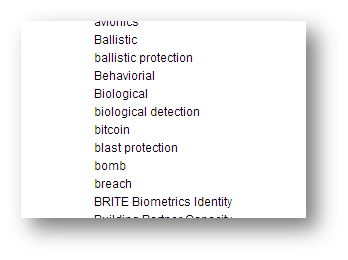Drugs, Scams, and Terrorism: Bringing Balance to Bitcoin Reporting
In recent days there have been a slew of articles published reporting how the Combating Terrorism Technical Support Office has listed Bitcoin as one threat area that they are seeking submissions to research in preparation for future possible terrorist attacks. According to a report in the IBTimes, Bitcoin has been included in the list due to its ability to ‘shape’ the future of threat finance.

It is no surprise that the U.S. military is taking an interest in Bitcoin. By its very nature, Bitcoin seems a perfect match for the criminal, the drug lord and the terrorist. It can be sent anywhere, anonymously and nearly instantly. Huge amounts of funds can be stored out of the reach of governments, sent instantly, or parceled out into tiny sums to support a worldwide network of evil doers.
The reality is likely to be a bit different, though. The first problem with this scenario is that Bitcoin is still a very illiquid currency. While trading at LocalBitcoins.com for small sums remains a viable option, cashing out on any of the major exchanges is going to mean that the terrorists will need a bank account, address, or other identifying information which will automatically be seen of as ‘of interest’ due to its association with Bitcoin. Then there is the fact that any major movement of Bitcoin into fiat is going to cause a major price shift, diluting the amount of money the terrorists can get for their project.
And then there is always the possibility that investigators could track and monitor these Bitcoin transactions. The identity of wallet holders can be anonymous if they are careful, but the transactions themselves aren’t hidden. On my site I have a donation QR code prominently displayed. The address for that QR code is solidly linked to me, which means that all of the addresses in my wallet could probably be linked to me, and from there my transactions with Coinbase, Blockchain, Mt. Gox, the guy a had make a Bitcoin ticker for me, … Bitcoin might make it easier to ship money across borders, but it doesn’t guarantee that you won’t get caught.
It seems likely that Bitcoin may well one day turn up in an investigation of a terrorist plot, but it will also likely be only one tool in the terrorists’ toolkit. They will also likely continue to use all the tried and true means of hiding, laundering, and distributing money as they always have. Edward Lowery, a special agent with the Secret Service during a hearing on FinCEN regulations last November remarked, “High level international cybercriminals have not by-and-large gravitated to the peer-to-peer cryptocurrency, such as bitcoin.” Shasky Calvery added later in the hearing that “cash is probably still the best medium for laundering money.”
Bitcoin by its very nature is an oppositional currency. It is often compared to the Internet, and in some ways this is apt, but it is also incomplete. The entrenched interests that the Internet challenged weren’t as central to the root of power and privilege. Bitcoin has the potential to upend the apple cart, and that is something that makes a great many people uncomfortable. When people are faced with uncertainty, as frequently as not, they deride and vilify it. The claims that Bitcoin is the currency of drug lords and terrorists is going to continue to be a central feature of most reporting about Bitcoin for the foreseeable future. The inclusion of Bitcoin in this announcement will just give journalists one more thing to add to their list of Silk Road (drugs), Mt. Gox (scams and hacks), and Charlie Shrem (money laundering).
What doesn’t seem to take as prominent a place in the articles being published are the potential advantages of Bitcoin: no need for banks to save, send, or spend; low fees; depreciatory – meaning that their value can reliably be expected to rise; made for the Internet; no account freezes or seizures; will provide opportunity to people and businesses around the globe who are currently not banked; can be used for sousveillance – watching the government; and will spark a whole new round of innovation in decentralized technology and services with the possibility to transform the world.
Bitcoin is still young and still needs quite a lot of development. It’s potential is great, however. It would be nice to see journalists balance their articles with that.
Mark Norton of BitcoinWarrior.com 05/07/2014

